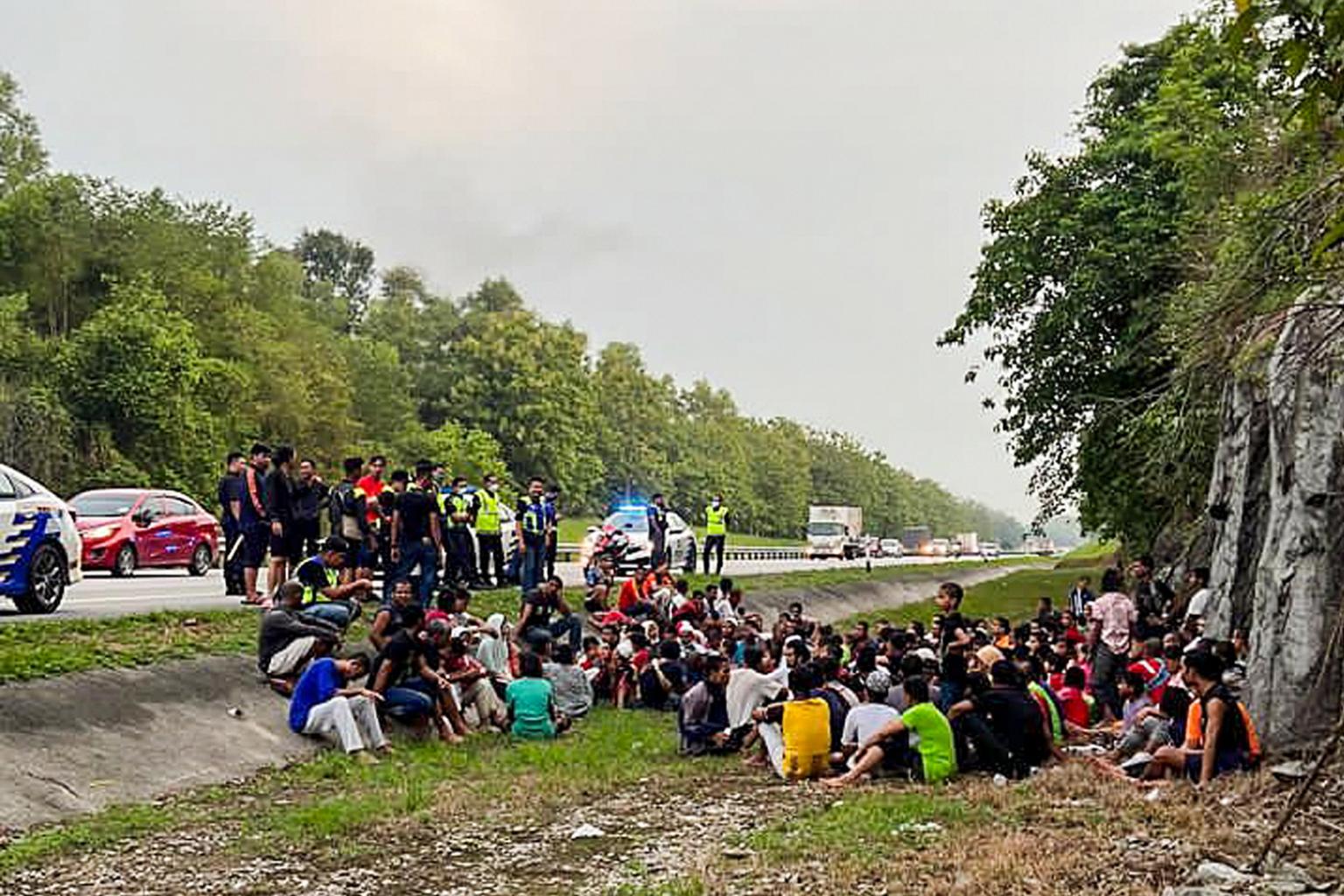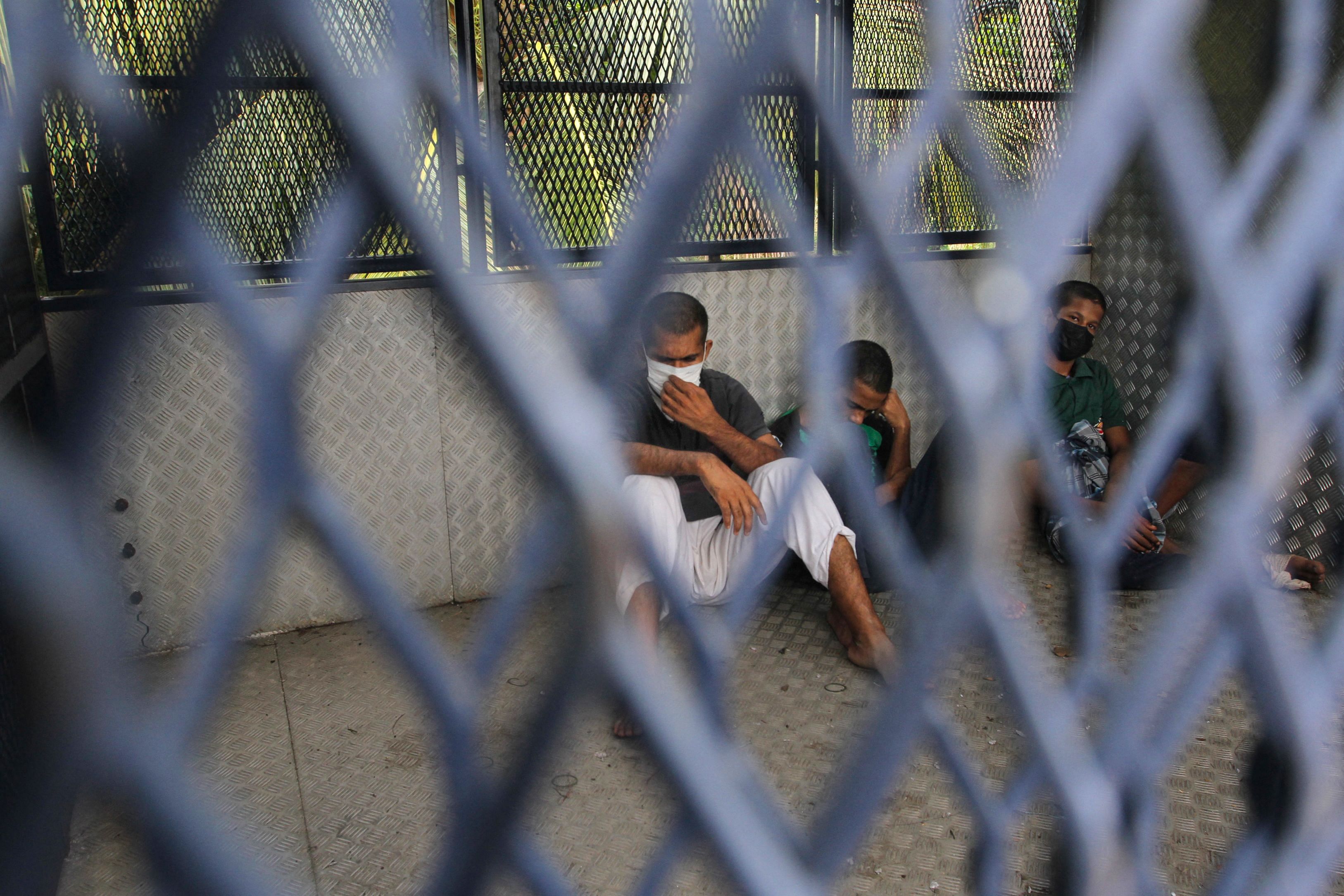More than 500 Rohingya detainees escape from Penang detention centre, at least 6 died while fleeing
Sign up now: Get insights on the biggest stories in Malaysia

The authorities had rearrested 357 of the fugitives while at least six of them have died, said the Kedah police chief.
PHOTO: EPA-EFE
KUALA LUMPUR - More than 500 Rohingyas fled a Malaysian immigration detention centre in Penang following a pre-dawn breakout on Wednesday (April 20), with six of them killed on a road later.
The Malaysian Immigration Department said that 528 detainees had escaped the Sungai Bakap temporary detention centre, which straddles the border between Penang and Kedah states, at 4.30am.
The Rohingya Muslims are an ethnic group from the Buddhist-majority Myanmar who are largely stateless after Myanmar refused to recognise their citizenship.
Since 2015, a refugee crisis resulting from sectarian violence in Myanmar’s Rakhine state against the Rohingyas has seen millions from the minority group flee Myanmar for neighbouring countries.
Malaysia is the country with the fourth largest population of Rohingyas outside Myanmar, after Bangladesh, Pakistan and Saudi Arabia. More than 150,000 Rohingyas live in Malaysia according to recent estimates.
The largest concentration of Rohingyas are in Bangladesh, with over 1.3 million housed in detention camps there.
The police have so far declined to comment on the cause of Wednesday’s breakout. A report in The Star said that the incident was triggered by a protest which quickly turned into a riot.
Immigration director-general Khairul Dzaimee Daud said that the detainees had broken down the main door and grilles of the centre.
Penang police chief, Commissioner Datuk Shuhaily Mohd Zain, told the media on Wednesday that the authorities had arrested 357 of the fugitives as at late afternoon, while another six of them had died.
The search is ongoing for another 165 still at large. They are believed to be barefoot and heading south in large groups. Police said the group include at least 12 children, one as young as one year old. Thirteen roadblocks have been set up in Penang and Kedah.
Commissioner Wan Hassan Wan Ahmad, the Kedah police chief, said the six who died were hit by vehicles while trying to cross a busy road in Jawi, Penang, some 8km from the camp.
Among those who died were two children - a boy and a girl. There were 137 children in the detention centre at the time of the breakout, although it is not clear how many of them had fled.
The camp had 664 detainees in total before the prison break, and only 136 remained there after the incident.
Commissioner Wan Hassan said that at the time of the incident, there were only 23 immigration officers on duty and they were quickly overwhelmed by the riot. He said the officers had sought the police’s assistance as the riot and breakout escalated. No security officials were injured.
“There might be an element of unhappiness (leading to the incident),” he said, while declining to disclose further details citing ongoing investigations.

<p>Rohingya migrants, who had escaped from a detention centre after a riot, sit in a Malaysian Immigration truck after being recaptured in Penang on April 20, 2022. - Hundreds of Rohingya migrants from Myanmar escaped a detention centre in Malaysia on April 20 after a riot broke out, with six killed on a highway as they fled, authorities said. (Photo by AFP)</p>
PHOTO: AFP
The incident is being investigated under Section 224 and 147 of the Penal Code for obstruction of a lawful arrest and rioting. Both sections provide for up to two years’ imprisonment.
The Malaysian Human Rights Commission (Suhakam) on Wednesday urged an independent body to be set up to probe into the cause of the incident. The police have also set up a special investigation team.
The incident is bound to renew focus on the conditions of detention camps in Malaysia and also the treatment of migrants housed there.
Malaysia’s treatment of migrants, including in detention camps, was the subject of a controversial Al Jazeera documentary in 2020. The authorities reacted strongly to criticism in the documentary, expelling a Bangladeshi migrant worker who was featured in the documentary criticising Malaysian authorities.

Last year, Malaysian activist Heidy Quah, who works with refugees, was charged with allegedly “insulting others” after she criticised conditions in detention camps.
Many of the Rohingya detainees were transferred to the camp just less than a year ago, from an immigration camp on the island of Langkawi. Mr Khairul last year said that the transfer was made due to inadequate food logistics for the detainees in the Langkawi camp.
Langkawi is one of the main entry ports for Rohingya refugees attempting to enter Malaysia while fleeing communal violence in Myanmar.
Malaysia, which does not formally recognise refugees, considers them to be illegal immigrants, although a few that carry United Nations High Commissioner for Refugees cards are allowed to stay in the country.


